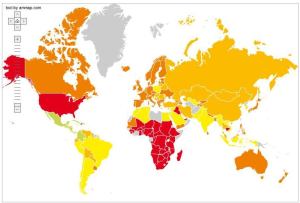Consumer Confidence is regularly polled and is always a major news story. It is presented as an indicator of, alternately, political success and of how we are progressing as a nation or how badly we are teetering on the brink of becoming a third world country. Indeed, the same poll results can be reported as Home rates on hold, consumers positive while National disasters erode consumer confidence. Meanwhile, the soothsayers proclaim Retail to go from ‘bad to worse’.Underlying all these reports is an unspoken assumption hidden in plain sight: that consuming is both desirable and a valid indicator of how successful a country is. The 100 Thing Challenge is also aptly named, since it seeks to challenge such an assumption. Why should how much we are consuming, how many objects we are prepared to buy, the amount of money we are willing to spend, be any indicator of success?
Not every country thinks that increasing consumption (taken to its extreme – a logical impossibility in a limited world) indicates the most important data. Bhutan famously has instituted Gross National Happiness as a measure more wide-ranging and appropriate. Elsewhere, a Happy Planet Index has been established to measure sustainable well-being.
Rather than chasing an ever receding goal like Consumer Confidence, these alternative measures show a more holistic picture: sustainability, poverty, happiness and life expectancy. It is sobering to consider the most recent data from the Happy Planet Index shown below (ranging from Red – poor – to Green – good).
Not every country thinks that increasing consumption (taken to its extreme – a logical impossibility in a limited world) indicates the most important data. Bhutan famously has instituted Gross National Happiness as a measure more wide-ranging and appropriate. Elsewhere, a Happy Planet Index has been established to measure sustainable well-being.
Rather than chasing an ever receding goal like Consumer Confidence, these alternative measures show a more holistic picture: sustainability, poverty, happiness and life expectancy. It is sobering to consider the most recent data from the Happy Planet Index shown below (ranging from Red – poor – to Green – good).

The poorest countries are some of the most poverty stricken ones in Africa, but also tellingly the home of obligatory consumerism, the USA. Australia ranks a rather poor 102 out of 143 countries.
Geoff Lemon has pointed out (NSFW) in the context of the Carbon Tax that Australia is actually doing really well. Even those who may be marginalised or poor are fundamentally much better off than the vast majority of the world, and yet we are constantly claiming (or being told by the media?) that we are struggling, badly done by, suffering, barely getting by and generally in a parlous state.
Isn’t it time that we had a better indicator of our values?
